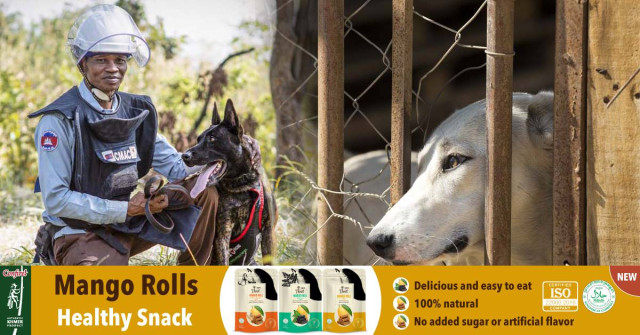Public Calls for Dog Meat Ban

- By Meng Seavmey
- January 16, 2024 2:10 PM
PHNOM PENH – The trade of dog meat has become more concerning due to an increasing number of consumers across the country. The public and organizations are calling for legal action against the breeding and slaughtering of dogs for consumption.
“It is a precious tradition of Khmer not to consume dog meat. Yet, many people, especially young people, have grown to like such meat nowadays,” said Heng Ratana, director-general of the Cambodian Mine Action Centre (CMAC), adding that dogs have been important companions in mine clearing for many years.
Eating dog meat ruins traditions, breaks social morality and affects tourists’ perceptions of Cambodia, Ratana said.
Following the voting of a law banning the consumption of dog meat in South Korea on Jan. 9, he said Cambodia should also legislate on the matter and take legal action against people who feed this market, both breeders and consumers.
“I believe Cambodia can do it too, with relevant ministries prohibiting the consumption of dog meat, as there are already laws on animals and food control,” he said.
Four Paws Cambodia, an NGO providing lifesaving care for dogs and cats, strongly supports a ban on the trade of dog meat.
“Dogs are not livestock, so eating their meat is a cruel act. Dogs are different from farm animals,” said the country manager, who asked not to be named, on Jan. 12.
“Consuming dog meat is not a culture of Cambodian people either, but it has increased in the past years, especially among young adults,” she said.
According to the organization’s data, around two to three million dogs are killed for their meat every year in Cambodia.
A report from the organization established that in 2020 “around 53.6 percent of Phnom Penh residents [had] consumed dog meat” at least once in their lives, with 72.4 percent of them being men.
“More than half of the sample population had consumed dog meat more than 10 times, while 12.2 percent were regular consumers,” the report stated.
Driving forces for consumption
Beliefs can be hard to change. While it has become ‘cooler’ to consume dog meat, especially among the youth, some also believe it is a better source of proteins for women who just gave birth, the Four Paws manager pointed out.
But she stressed that such an assumption is wrong, and implies sanitary risks for the women as dog meat is rarely processed in good hygiene conditions.
In addition to being trendy, the increase in dog meat consumption has probably to do with its price, which is lower than that of beef and pork.
“The cheap price increases the demand for the meat. Some young people consider themselves as ‘cool’ or ‘brave’ for being able to eat it,” said the manager.
“Sometimes, sellers claimed that the dogs had been aggressive towards people,” she added, stressing they present it as a legitimate reason for killing the animal.
‘Dogs are family members, not just pets’
As demand for dog meat grows, dog breeding is unable to supply sufficient quantities, opening the door to dog theft.
Sun Socheata, a resident of a small village in Takeo province, said three of her dogs were taken and probably slaughtered by unidentified people, the last case being about three months ago.
While she doesn’t know exactly what happened to them, she believes they’ve been taken for their meat.
“I was trying to find them in the village and even posted several posts for ‘missing dogs’ on social media, but to no avail,” she told Cambodianess on Jan. 15.
Socheata used to own ten dogs, some of them being the offspring of her parents’ dogs.
“Their disappearance was like a departure from a family member,” she said. "They were clever and never caused trouble. Although they were a little unfriendly to strangers, they listened to me well.”
Socheata believes that a law to ban dog meat consumption would make a big difference in protecting dogs, but suggests that the focus should be on sellers and traders because they are the suppliers.
“If there’s no one to sell it, there’ll be no buyers, thus no consumers,” she said.
Socheata added that the law should allow dog owners to sue the perpetrators for killing their animals because their lives are also valuable.
Chom Channit, another dog passionate, shares Socheata’s views that eating dog meat is unacceptable and requests a ban on dog meat consumption.
“I think of them as family members,” she said, referring to her five dogs. “They play with me, keeping me good company when I’m alone, and they always wait for me to come home from school or work.”
Channit believes that having legal action against those who trade or consume dog meat would be an effective way to protect dogs.
“But a law only offers half a protection. We need to better educate people, especially those who consume dog meat, so that they re-consider their behavior,” she said.
She suggested that the country should have a public center for taking care of and taking in stray dogs so that they could be adopted rather than being slaughtered for meat.
“The center would be very helpful in case the past owners cannot raise their dog(s) anymore,” she said.
Ongoing solutions
Since 2021, Four Paws Cambodia has been running an online campaign to call for an end to “the cruel dog and cat meat trade.”
Thus far, more than 2.1 million people signed the petition and the organization is preparing another method to gather the public’s opinions on dog trading.
Three years ago, the organization also established a full-time adoption center to help dogs being adopted by families in Cambodia and foreign countries.
Judging by the signature, the organization seems hopeful that more and more people have grown to love and value dogs’ lives.















